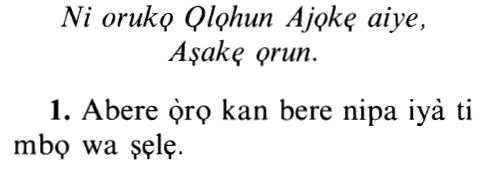70vs1
Select any filter and click on Go! to see results
سَأَلَ سَائِلٌ بِعَذَابٍ وَاقِعٍ
Saala sailun biAAathabin waqiAAin
Index Terms
Click to play
Yoruba Translation

Hausa Translation
Wani mai tambaya yã yi tambaya game da azãba, mai aukuwa.
Asbabu n-Nuzuul (Occasions of Revelation)
(A questioner questioned concerning the doom about to fall) [70:1]. This verse was revealed about al-Nadr ibn al-Harith when he said [as reported in the Qurメan] (O Allah! if this be indeed the truth from Thee, then rain down stones on us or bring on us some painful doom!) [8:32], and so he prayed against himself and
asked for chastisement. He got what he asked for at the Battle of Badr when he was killed in captivity. And the verse (A questioner questioned concerning the doom about to fall) was revealed about him.
A Request to hasten the Day of Judgement
Allah says that,
سَأَلَ سَائِلٌ بِعَذَابٍ وَاقِعٍ ﴿١﴾
A questioner asked concerning a torment about to befall,
This Ayah contains an assumed meaning that is alluded to by the letter "Ba''. It is as though it is saying, a questioner requested to hasten on the torment that is about to fall.
It is similar to Allah's statement,
وَيَسْتَعْجِلُونَكَ بِالْعَذَابِ وَلَن يُخْلِفَ اللَّهُ وَعْدَهُ
And they ask you to hasten on the torment! And Allah fails not His promise. (22:47)
meaning, that its torment will occur and there is no avoiding it.
Al-`Awfi reported from Ibn `Abbas concerning the Ayah, سَأَلَ سَائِلٌ بِعَذَابٍ وَاقِعٍ (A questioner asked concerning a torment about to befall),
"That is the questioning of the disbelievers about the torment of Allah and it will occur to them.''
Ibn Abi Najih reported from Mujahid that he said concerning Allah's statement سَأَلَ سَائِلٌ (A questioner asked),
"A person called out (requesting) for the torment that will occur in the Hereafter to happen.''
Then he said, "This is their saying,
اللَّهُمَّ إِن كَانَ هَـذَا هُوَ الْحَقَّ مِنْ عِندِكَ فَأَمْطِرْ عَلَيْنَا حِجَارَةً مِّنَ السَّمَآءِ أَوِ ائْتِنَا بِعَذَابٍ أَلِيمٍ
O Allah! If this is indeed the truth from you, then rain down stones on us from the sky or bring on us a painful torment.'' (8:32)
فيه تضمين دل عليه حرف الباء كأنه مقدر استعجل سائل بعذاب واقع كقوله تعالى " ويستعجلونك بالعذاب ولن يخلف الله وعده " أي وعذابه واقع لا محالة. قال النسائي حدثنا بشر بن خالد حدثنا أبو أسامة حدثنا سفيان عن الأعمش عن المنهال بن عمرو عن سعيد بن جبير عن ابن عباس في قوله تعالى" سأل سائل بعذاب واقع " قال النضر بن الحارث بن كلدة وقال العوفي عن ابن عباس " سأل سائل بعذاب واقع " قال ذلك سؤال الكفار عن عذاب الله وهو واقع بهم وقال ابن أبي نجيح عن مجاهد في قوله تعالى " سأل سائل " دعا داع بعذاب واقع يقع في الآخرة قال وهو قولهم " اللهم إن كان هذا هو الحق من عندك فأمطر علينا حجارة من السماء أو ائتنا بعذاب أليم " وقال ابن زيد وغيره " سأل سائل بعذاب واقع " أي واد في جهنم يسيل يوم القيامة بالعذاب وهذا القول ضعيف بعيد عن المراد والصحيح الأول لدلالة السياق عليه . أي مرصد معه للكافرين وقال ابن عباس " واقع " جاء .
سورة المعارج [ مكية وآياتها أربع وأربعون آية ] "سأل سائل" دعا داع
سورة المعارج وهي مكية باتفاق . وهي أربع وأربعون آية قرأ نافع وابن عامر " سال سايل " بغير همزة . الباقون بالهمز . فمن همز فهو من السؤال . والباء يجوز أن تكون زائدة , ويجوز أن تكون بمعنى عن . والسؤال بمعنى الدعاء ; أي دعا داع بعذاب ; عن ابن عباس وغيره . يقال : دعا على فلان بالويل , ودعا عليه بالعذاب . ويقال : دعوت زيدا ; أي التمست إحضاره . أي التمس ملتمس عذابا للكافرين ; وهو واقع بهم لا محالة يوم القيامة . وعلى هذا فالباء زائدة ; كقوله تعالى : " تنبت بالدهن " [ المؤمنون : 20 ] , وقوله . " وهزي إليك بجذع النخلة " [ مريم : 25 ] فهي تأكيد . أي سأل سائل عذابا واقعا .
I'raab - grammatical analysis of the Qur'an
«سَأَلَ سائِلٌ» ماض وفاعله «بِعَذابٍ» متعلقان بالفعل «واقِعٍ» صفة عذاب والجملة ابتدائية لا محل لها
